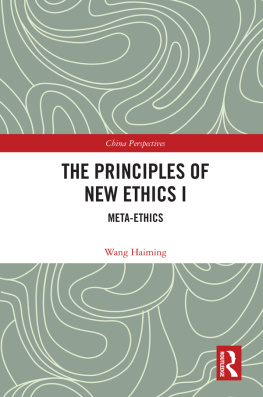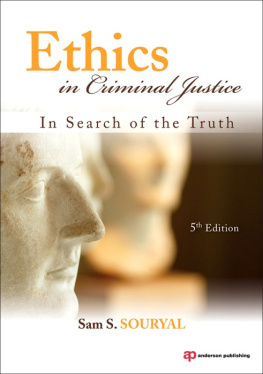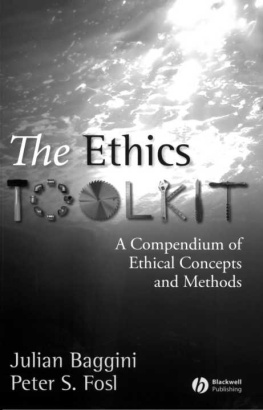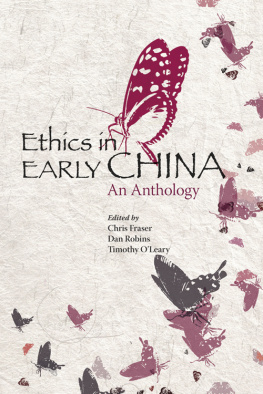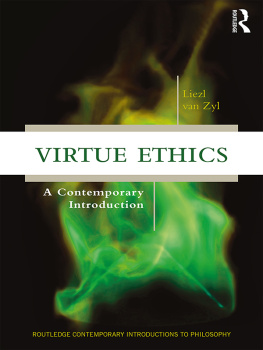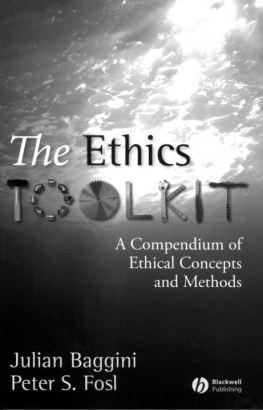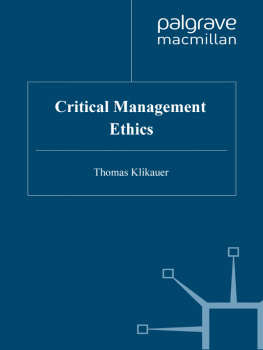The Principles of New Ethics I
From Descartes to Spinoza, Western philosophers have attempted to propose an axiomatic systemization of ethics. However, without consensus on the contents and objects of ethics, the system remains incomplete. This four-volume set presents a model that highlights a Chinese philosophers insights on ethics after a 22-year study. Three essential components of ethics are examined: metaethics, normative ethics, and virtue ethics.
This volume mainly studies meta-ethics. The author not only studies the five primitive concepts of ethicsvalue, good, ought, right, and factand reveals their relationship, but also demonstrates the solution to the classic Humes guillotinewhether ought can be derived from fact. His aim is to identify the methods of making excellent moral norms, leading to solutions on how to prove ethical axioms and ethical postulates.
Written by a renowned philosopher, the Chinese version of this set sold more than 60,000 copies and has exerted tremendous influence on the academic scene in China. The English version will be an essential read for students and scholars of ethics and philosophy in general.
Wang Haiming is a professor at the Department at Philosophy at Peking University, China, and a specially appointed professor at Sanya University, China, mainly studying ethics and political philosophy. Email:
China Perspectives
The China Perspectives series focuses on translating and publishing works by leading Chinese scholars, writing about both global topics and China-related themes. It covers Humanities & Social Sciences, Education, Media and Psychology, as well as many interdisciplinary themes.
This is the first time any of these books have been published in English for international readers. The series aims to put forward a Chinese perspective, give insights into cutting-edge academic thinking in China, and inspire researchers globally.
Titles in philosophy currently include:
Leaping Over the Caudine Forks of Capitalism
Zhao Jiaxiang
Theories and Practices of Scientific Socialism
Zhao Jiaxiang
The Principles of New Ethics III
Normative Ethics II
Wang Haiming
The Principles of New Ethics I
Meta-ethics
Wang Haiming
The Principles of New Ethics II
Normative Ethics I
Wang Haiming
The Metaphysics of Philosophical Daoism
Kai ZHENG
For more information, please visit www.routledge.com/series/CPH
The Principles of New Ethics I
Meta-ethics
Wang Haiming

This book is published with financial support from the Chinese Fund for the Humanities and Social Sciences.
First published in English 2021
by Routledge
2 Park Square, Milton Park, Abingdon, Oxon OX14 4RN
and by Routledge
52 Vanderbilt Avenue, New York, NY 10017
Routledge is an imprint of the Taylor & Francis Group, an informa business
2021 Wang Haiming
Translated by Yamin Wu; translation polished by Martin Noble and Matthew Hood and proofread by Yang Aihua.
The right of Wang Haiming to be identified as author of this work has been asserted by him in accordance with sections 77 and 78 of the Copyright, Designs and Patents Act 1988.
All rights reserved. No part of this book may be reprinted or reproduced or utilised in any form or by any electronic, mechanical, or other means, now known or hereafter invented, including photocopying and recording, or in any information storage or retrieval system, without permission in writing from the publishers.
Trademark notice: Product or corporate names may be trademarks or registered trademarks, and are used only for identification and explanation without intent to infringe.
English Version by permission of The Commercial Press.
British Library Cataloguing-in-Publication Data
A catalogue record for this book is available from the British Library
Library of Congress Cataloging-in-Publication Data
A catalog record has been requested for this book
ISBN: 978-1-138-33161-7 (hbk)
ISBN: 978-0-429-44721-1 (ebk)
Typeset in Times New Roman
by Newgen Publishing UK
Contents
PART I
Categories of meta-ethics
PART II
The meta-ethical proof
Utilitarianism is a most vital field of thinking in contemporary Chinese pluralistic thought. It is rooted in Chinese peoples everyday life experience. If we should choose a leading figure of utilitarianism in China, Professor Wang Haiming is undoubtedly the best candidate. He is the first to systematically expound the principles of utilitarianism in contemporary China and the first in China to put forward new principles in what can rightly be called the new utilitarianism. In the past, both in the West and China, utilitarianism has predominantly advocated the principle of net balance of the maximum interests or the greatest interests for the greatest number as the ultimate goal of morality. The measurement of all actions under the new utilitarianism established by Wang Haiming is, as a crucial point of difference, rather a system of the ultimate standard of morality. The net balance of maximum interests is conditional in that is only the ultimate standard of morality in the circumstance of interest conflicts, increasing the quantum of interests without negatively affecting anyone. The ultimate standard of morality is to be found in the circumstance that the interests do not conflict with one another, therefore increasing or decreasing everyones quantum of interests is the ultimate standard of morality and should be absolutely followed under any circumstance. Obviously, this new utilitarianism can avoid the criticism that utilitarianism certainly leads to injustice.
Wang Haimings utilitarian thought, which originates from the profound utilitarian tradition of China, is closely related to the ethical thoughts of Western utilitarianism, and is deeply rooted in the life of the Chinese people whose thinking and behaviors have changed with the process of market economy reform in contemporary China. The formation of his utilitarian thought comes from his frank and sincere personal character, as well as from his discontentment with, and criticism of the hypocrisy surrounding ethical conduct and moral norms prevalent in China when he was a young man. The utilitarian thinking of this work is therefore characterized not only by his understanding of the everyday life experiences of the Chinese people, but also by his own lived experience and acute sense of right or wrong, much of which also reflects his deep immersion in scholarly studies of formal logic. The utilitarian theory he has cultivated completely discards anything that is beyond the realities of human nature and society and any kind of ethical thinking that is hypocritical.
Perhaps, for some time, certain hypocritical ethical principles will still prevail with the support of social or political power, but these sorts of principles will never have the universal and eternal values as that of the utilitarian principles and doctrine expounded by Wang Haiming. The blood, sweat and tears of ordinary Chinese people, their honorable conduct and way of thinking, are what weighs on Wang Haimings mind and motivates his ethical principles. In this way, his work can be seen as both an indictment of specious morals and a call for the return to a world based on true moral conduct. The utilitarianism proffered by Wang Haiming, in its consideration of the concept of self-interest, is by no means a theory for the justification of selfishness, in fact, his criticism of egoism shows that his utilitarianism is based on one of the most fundamental principles of human nature: justice. It is most gratifying that he has inherited and popularized the critical spirit of the May 4th Movement, that his utilitarianism and the theory of justice have fallen in love and are integrated into a coherent whole.

